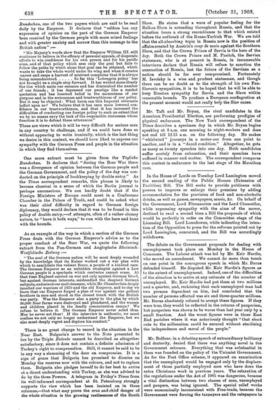There is no great change to record in the situation
in the Near East. Bulgaria's answer to the Note presented to her by the Triple Entente cannot be described as altogether satisfactory, since it does not contain a definite admission of Turkey's right to compensation. Still, it cannot be said to be in any way a slamming of the door on compromise. It is a sign of grace that Bulgaria has promised to dismiss on Monday the reserves now with the colours, and not to replace them. Bulgaria also pledges herself to do her best to arrive at a direct understanding with Turkey, as she was advised to do by the three Powers. A telegram in Friday's Times from its well-informed correspondent at St. Petersburg strongly supports the view which has been insisted on in these columns,—that what may prove the crux and chief danger of the whole situation is the growing restlessness of the South Slays. He states that a wave of popular feeling for the Balkan Slays is extending throughout Russia, and that the situation bears a strong resemblance to that which existed before the outbreak of the Russo-Turkish War. We are told that the all-absorbing topic in Russia now is the position of affairs created by Austria's coup de main against the Southern Slays, and that the Crown Prince of Servia is the hero of the day. Both the Crown Prince and M. Pasitch, the Servian statesman, who is at present in Russia, in innumerable interviews declare that Russia will refuse to sanction the annexation of Bosnia, lest the future of the Servians as a nation should be for ever compromised. Fortunately M. Isvolsky is a wise and prudent statesman, and though there can be no doubt as to the strength of his own Pan- Slavonic sympathies, it is to be hoped that be will he able to keep Russian sympathy for Servia and the Slays within reasonable bounds. To produce a European conflagration at the present moment would not really help the Slav cause.














































 Previous page
Previous page